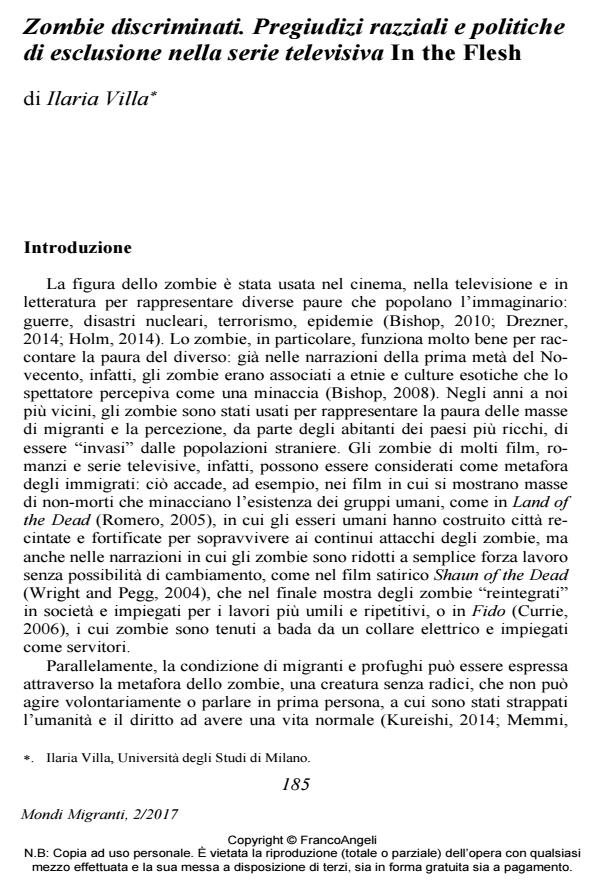Zombie discriminati. Pregiudizi razziali e politiche di esclusione nella serie televisiva In the Flesh
Titolo Rivista MONDI MIGRANTI
Autori/Curatori Ilaria Villa
Anno di pubblicazione 2017 Fascicolo 2017/2
Lingua Italiano Numero pagine 19 P. 185-203 Dimensione file 188 KB
DOI 10.3280/MM2017-002010
Il DOI è il codice a barre della proprietà intellettuale: per saperne di più
clicca qui
Qui sotto puoi vedere in anteprima la prima pagina di questo articolo.
Se questo articolo ti interessa, lo puoi acquistare (e scaricare in formato pdf) seguendo le facili indicazioni per acquistare il download credit. Acquista Download Credits per scaricare questo Articolo in formato PDF

FrancoAngeli è membro della Publishers International Linking Association, Inc (PILA), associazione indipendente e non profit per facilitare (attraverso i servizi tecnologici implementati da CrossRef.org) l’accesso degli studiosi ai contenuti digitali nelle pubblicazioni professionali e scientifiche.
La figura dello zombie è stata spesso usata nel cinema, nella televisione e in letteratura per raccontare la paura del diverso. In questo filone narrativo si inserisce la miniserie televisiva Britannica In the Flesh (2013-2014), in cui, per la prima volta nella storia del genere, i protagonisti sono degli zombie che ricevono cure mediche. Nonostante, grazie alla cura, gli zombie abbiano riacquistato coscienza e non abbiano più fame di cervelli, la loro reintegrazione in società è ostacolata dalla maggior parte dei vivi, che continuano a provare repulsione per loro: in questo modo viene raccontata indirettamente la discriminazione dei migranti. Il parallelismo tra zombie e migranti viene portato avanti su più livelli, di cui questo saggio propone un’analisi. L’aspetto interessante della serie non è soltanto l’attualità dei temi proposti, ma anche il fatto che lo spettatore viene portato ad interrogarsi sui propri pregiudizi e su aspetti relativi alla gestione dell’immigrazione che spesso vengono dati per scontati.
Parole chiave:Zombie; migranti; televisione; discriminazione; serie tv.
Ilaria Villa, Zombie discriminati. Pregiudizi razziali e politiche di esclusione nella serie televisiva In the Flesh in "MONDI MIGRANTI" 2/2017, pp 185-203, DOI: 10.3280/MM2017-002010